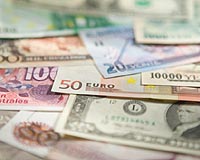| . |  |
. |
Washington (AFP) March 25, 2010 Americans are lining up to snap up rebates for "cash for refrigerators" and "dollars for dishwashers," as part of a US government program aimed at both economic stimulus and reduced emissions. The effort, modeled after the "cash for clunkers" auto trade-in program, includes nearly 300 million dollars to encourage consumers to dump older appliances in favor of newer, energy-efficient models. US officials say the effort, a small part of the nearly 800-billion-dollar economic stimulus measure enacted last year, will help reduce the US carbon footprint because of the heavy electrical consumption of big appliances, and at the same time pump money into the economy that can create jobs. One one level, the program, which is being administered by individual states, appears to be succeeding in jump-starting sales. In Iowa, which offered rebates up to 500 dollars on refrigerators, washing machines and dishwashers, the 2.7 million dollars in federal funds was exhausted in less than a day by stampeding consumers. Minnesota needed less than three days to give out five million dollars in appliance rebates. In Ohio, which launched its program Friday with 10.5 million dollars, the state agency administering it said it "anticipates the rebates will be exhausted in a few weeks." As of this week, New York still had 5.6 million dollars remaining from its 18.7 million dollars even though some waited in line on the opening weekend. "It's been a boon to consumers and retailers," said Francis Murray of the New York State Energy and Research Development Authority. The biggest of the state programs will be launched in California April 22, with 35.2 million dollars. And more states will be launching rebate programs in the coming months. To qualify for rebates, consumers must buy appliances which meet energy standards set by the federal government and are up to 30 percent more efficient than existing models. Some states are offering extra rebates if consumers recycle old appliances. Some see the program as a natural follow-up to the "clunkers" program, which boosted new car sales, and in turn lifted auto production and jobs to help pull the US economy out of its slump. Economist Ryan Sweet at Moody's Economy.com said the appliance program probably had an impact on sales and orders for durable goods, big-ticket items expected to last at least three years that are critical to the manufacturing sector. "Eight states launched rebate programs last month, which would help explain some of the strength in sales at both electronic and building material stores," he said. "This also argues for strong gains in subsequent months and lends some upside risk to our forecast for real durables spending." Joel Naroff at Naroff Economic Advisors said that while the clunkers program appeared to have a positive economic impact, the effect of the appliance program may be far less. He said the impact may be reduced even more for appliances made outside the United States. "On a 600 dollar washing machine, the retailer may make 100 dollars but the manufacturer will make 300 dollars," he said. "But if the manufacturer is on the other side of the world, that's 300 dollars that goes out of the economy." University of Delaware economists Burton Abrams and George Parsons argue that both the clunkers and appliance programs are lemons for taxpayers, mainly because they are destroying otherwise productive assets. The auto program, the economists say the societal loss was as much as 2,250 dollars per vehicle because "the value of resources used exceeded the value of resources created. In effect, we shrank the economic pie to improve the conditions of some workers and perhaps some sectors other than labor." For appliances, they say the overall loss is more modest, at six dollars for every 100 dollars invested. "In essence, the taxpayers... are putting 100 dollars into the pot on behalf of society as a whole," they concluded. "Society gets back nine dollars in environmental benefits. People who buy refrigerators, on average, get 85 dollars in value from the cash transfer. The other six dollars is lost to everyone."
Share This Article With Planet Earth
Related Links The Economy
 Walker's World: The looming debt
Walker's World: The looming debtParis (UPI) Mar 22, 2009 The euro financial drama is not over, even though the Greek situation has eased from panicked emergency down to mere crisis. In fact, the real debt problem is just beginning, with the vast majority still to come of the $405 billion in government bond debt that has to be redeemed this year. That $405 billion refers only to the bonds held by the PIIGS: Poland, Ireland, Italy, Greece and S ... read more |
|
| The content herein, unless otherwise known to be public domain, are Copyright 1995-2010 - SpaceDaily. AFP and UPI Wire Stories are copyright Agence France-Presse and United Press International. ESA Portal Reports are copyright European Space Agency. All NASA sourced material is public domain. Additional copyrights may apply in whole or part to other bona fide parties. Advertising does not imply endorsement,agreement or approval of any opinions, statements or information provided by SpaceDaily on any Web page published or hosted by SpaceDaily. Privacy Statement |